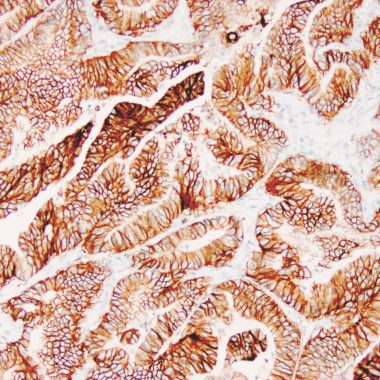Epithelial cell adhesion molecule (EP-CAM) is an approximate 40 kDa transmembrane glycoprotein. In paraffin sections, the protein is detected with many antibodies like anti-Ber-EP4 and anti-MOC-31. EP-CAM (Ber-EP4) is normally expressed at the basolateral membrane of cells in the majority of epithelial tissues. It is not expressed in adult squamous epithelia, hepatocytes, myoepithelial cells, mesothelial cells or fibroblasts. EP-CAM is found in the large majority of adenocarcinomas of most sites (50-100%) in various studies; as well as neuroendocrine tumors, including small cell carcinoma. Renal clear cell carcinoma, renal oncocytoma and hepatocellular carcinoma stain in a minority of the cases, but papillary renal cell carcinoma, chromophobe renal cell carcinoma and cholangiocarcinoma stain with clone Ber-EP4 at a higher percentage. Basal cell carcinoma is anti-Ber-EP4 positive in almost all skin squamous carcinoma. EP-CAM can be of great help in the differentiating malignant involvement in the peritoneal and pleural cavities.

